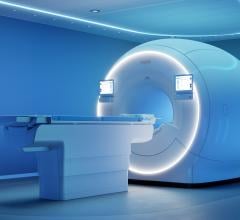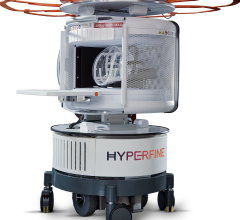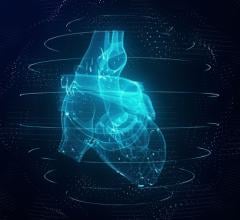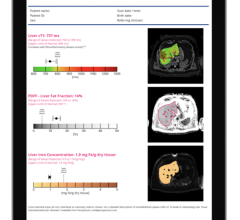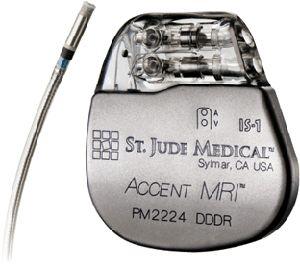
July 24, 2013 — St. Jude Medical Inc. announced regulatory approval from the Japanese Ministry of Health, Labor and Welfare (MHLW) and launch of the Accent MRI pacemaker and the Tendril MRI lead. Unlike MRI-labeled devices currently available, the Accent MRI pacemaker is the only commercially available system with labeling that allows patients to undergo full-body, high-resolution magnetic resonance imaging (MRI) scans to accommodate their current and future medical needs.
Commenting on the Accent MRI pacemaker, Dr. Toshiko Nakai, assistant professor of the Nihon University School of Medicine in Tokyo, said, “We are pleased to see the MRI-conditional pacemaker launched by St. Jude Medical. I believe the benefit of full-body scanning with 1.5T MRI, the 6 mm thinness, and ability to provide remote monitoring together make this device patient-friendly.”
MRI scans are important imaging procedures as they better evaluate the presence of certain diseases and injuries that may not be adequately assessed with other imaging methods, such as X-ray or ultrasound. Patients with traditional pacing systems are discouraged from receiving MRI scans because their device may be affected, which deprives them the standard of care MRI diagnostic technology provides.
"The Accent MRI pacemaker has many advantages over what is currently available for patients. The sophisticated pacemaker functionality and labeling of full-body MRI scans are especially important for patients who may need an MRI scan in the chest and abdominal area. We are excited to offer this innovative technology to hospitals throughout Japan,” said William Phillips, senior vice president of St. Jude Medical Asia.
The system features an MRI Activator device that provides a simple option for programming the patient’s pacemaker to the appropriate MRI mode. A button on the handheld MRI Activator can program the specific device parameters to be used during the scan. These parameters are pre-selected by the patient's physician and stored in the memory of the Accent MRI pacemaker. The MRI Activator can then program the device back to its original parameters after the scan has been completed.
Built on the Tendril lead platform, the pacing lead offers unique capabilities for safe, full-power MRI scanning, including 6 French proximal lead body diameter and excellent handling characteristics. The lead features Optim lead insulation, the first silicone-polyurethane co-polymer material created specifically for cardiac lead use. The Optim insulation is designed for long-term reliability, while providing physicians with better flexibility and handling to facilitate device implantation.
Additionally, the Accent MRI pacemaker features an advanced pacing platform that offers wireless telemetry and algorithms to address individual patient conditions, with the added benefit of MRI-conditional scanning capability. Wireless communication is used when clinicians implant the device and during follow-up appointments, which can be performed in the office or through remote monitoring via Merlin.net’s Patient Care Network (PCN), a secure Internet-based remote care system. Also included is AutoCapture pacing system technology that measures the heart's reaction to pacing beat-by-beat, and the VIP algorithm that enables the heart's intrinsic rhythm to prevail when appropriate, thereby reducing unnecessary ventricular pacing.
A clinically proven atrial arrhythmia monitoring algorithm by St. Jude Medical is also included in the Accent MRI pacemaker to help detect arrhythmias which may increase stroke risk. The ASSERT, or ASymptomatic AF and Stroke Evaluation in Pacemaker Patients and the AF Reduction Atrial Pacing Trial, was designed to determine whether the detection of arrhythmias using pacemaker-based diagnostics predicts an increased risk of stroke in elderly, hypertensive patients without any history of atrial fibrillation (AF). Results demonstrated that pacemaker patients who have no history of atrial tachycardia (AT) or AF, but have device-detected arrhythmias, are approximately 2.5 times more likely to have a stroke than patients who do not have device-detected arrhythmias.
Available in two different models, the Accent MRI DR pacemaker is a dual-chamber pacemaker that can sense and pace in the atrium and ventricle (the upper and lower chambers) of the right side of the heart. The Accent MRI SR pacemaker is a single-chamber pacemaker that can sense and pace in the right ventricle, the lower right chamber of the heart.
For more information: www.sjm.com


 January 21, 2026
January 21, 2026 


